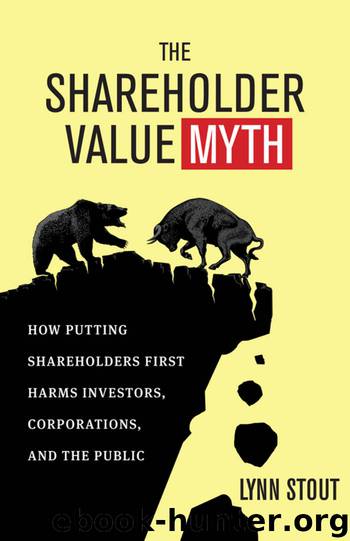The Shareholder Value Myth by Lynn Stout

Author:Lynn Stout
Language: eng
Format: epub
Publisher: Berrett-Koehler Publishers
Published: 2012-11-30T16:00:00+00:00
Different Time Frames, Clashing Interests
Once we recognize that stock markets are not perfectly fundamental value efficient and that managers can raise share price without improving real economic performance, we also have to recognize that shareholders with different investing time horizons have conflicting interests. The shareholder who plans to hold her stock for many years wants the company to invest in its employees’ skills, develop new products, build good working relationships with suppliers, and take care of customers to build consumer trust and brand loyalty—even if the value of these investments in the future is not immediately reflected in share price. The short-term investor who expects to hold for only a few months or days wants to raise share today, and favors strategies like cutting expenses, using cash reserves to repurchase shares, and selling assets or even the entire company. An important empirical study of activist hedge funds by Bill Bratton at the University of Pennsylvania confirms these are exactly the strategies activist funds demand. In Bratton’s words, “Activist hedge funds look for four things in their targets—potential sale of the whole, potential sale of a part, free cash, and cuttable costs.”106
This poses a dilemma for the standard shareholder-oriented model. Toward which shareholders is it oriented? If stock prices do not always capture fundamental value, a conflict of interest exists between long-term investors who want directors to invest in the company’s future, and short-term investors, especially activist hedge funds, who simply want to raise share price today. In the words of corporate lawyer Martin Lipton, directors must decide “whether the long-term interests of the nation’s corporate system and economy should be jeopardized in order to benefit speculators interested not in the vitality and continued existence of the business enterprises in which they have bought shares, but only in a quick profit on the sale of those shares?”107
Lipton’s language makes clear he’s on the side of the long-term investors, not the short-term speculators. I share his view, but I do not attempt in this book to provide a definitive answer to the difficult question of when and how directors should favor the interests of one kind of shareholder over those of another. The most important thing is to recognize that long-term investors and short-term activist hedge funds do not compete on a level playing field. Activist hedge funds have the clear advantage, because they concentrate their investment portfolios into just a few securities. This means it is worth their while to spend the time and effort necessary to become involved in a particular firm’s affairs. Diversified retail investors, by contrast, rarely have a big enough stake in any single company to make it sensible to closely monitor what’s going on; they suffer from their own rational apathy. Mutual funds are not much better. Most fund managers rationally conclude it is not in their clients’ interests for them to exercise an active governance role in the dozens or even hundreds of firms whose stocks the fund manager keeps in his portfolio. If there’s
Download
This site does not store any files on its server. We only index and link to content provided by other sites. Please contact the content providers to delete copyright contents if any and email us, we'll remove relevant links or contents immediately.
Hit Refresh by Satya Nadella(9133)
The Compound Effect by Darren Hardy(8966)
Change Your Questions, Change Your Life by Marilee Adams(7780)
Nudge - Improving Decisions about Health, Wealth, and Happiness by Thaler Sunstein(7706)
The Black Swan by Nassim Nicholas Taleb(7129)
Deep Work by Cal Newport(7083)
Rich Dad Poor Dad by Robert T. Kiyosaki(6632)
Daring Greatly by Brene Brown(6513)
Principles: Life and Work by Ray Dalio(6447)
Playing to Win_ How Strategy Really Works by A.G. Lafley & Roger L. Martin(6304)
Man-made Catastrophes and Risk Information Concealment by Dmitry Chernov & Didier Sornette(6019)
Big Magic: Creative Living Beyond Fear by Elizabeth Gilbert(5771)
Digital Minimalism by Cal Newport;(5764)
The Myth of the Strong Leader by Archie Brown(5507)
The Slight Edge by Jeff Olson(5417)
Discipline Equals Freedom by Jocko Willink(5389)
The Motivation Myth by Jeff Haden(5212)
The Laws of Human Nature by Robert Greene(5208)
Stone's Rules by Roger Stone(5087)
